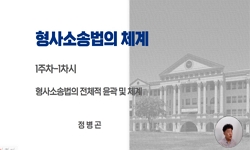Nondisclosure, classified as a general characteristic of alternative dispute resolution (ADR), has the advantage of enabling smooth dispute resolutions by enabling free communication and discussion between neutral parties in disputes. The mediation sy...
http://chineseinput.net/에서 pinyin(병음)방식으로 중국어를 변환할 수 있습니다.
변환된 중국어를 복사하여 사용하시면 됩니다.
- 中文 을 입력하시려면 zhongwen을 입력하시고 space를누르시면됩니다.
- 北京 을 입력하시려면 beijing을 입력하시고 space를 누르시면 됩니다.

당사자에 의한 언론조정 결과 왜곡 공표의 법적 문제점:실제 분쟁 사례를 중심으로 = Legal Problems with the Distorted Announcement of the Results of Press mediation by the Parties - Focusing on Actual Dispute Cases
한글로보기부가정보
다국어 초록 (Multilingual Abstract)
Nondisclosure, classified as a general characteristic of alternative dispute resolution (ADR), has the advantage of enabling smooth dispute resolutions by enabling free communication and discussion between neutral parties in disputes. The mediation system of the Press Arbitration Commission, a representative ADR organization on media disputes, is also closed in principle according to Article 19(8) of the Press Arbitration Act. However, the parties to press mediation continue to arbitrarily distort and publish mediation results, undermining the principle of nondisclosure of mediation procedures. Furthermore, it is possible to continuously witness that the original function of the press mediation system is overshadowed, such as disputes leading to more mediation cases or becoming lawsuits. This study discusses the dispute aspects and issues caused by the distortion of the mediation results by the press mediation parties, summarizes the matters that the mediation parties should pay attention to concerning the mediation result disclosures, and proposes matters that need to be improved at the practical and institutional levels. As a result, the pattern of disputes due to the distortion of the media mediation result was classified mainly into (1) the distortion of the case outcome’s type, (2) the distortion of the case’s outcome, (3) the distortion of the case’s progress, and (4) publishing reports denying the mediation’s content while implementing agreements. The reasons for the distortion of mediation results being different from the facts appear to be the motivations to interpret the outcomes of disputes in their favor by grasping the mediation procedure as a confrontation structure, such as an initial lawsuit. Arbitral tribunals need to imprint precautions related to the disclosure of the mediation procedure and the disclosure of mediation results on the mediation hearing date to prevent mediation result distortions. Measures like stating the details of the nondisclosure of the mediation in the mediation agreement may also be considered. Even if the parties inevitably announce the mediation results, they must be handled carefully based on a clear understanding of the legal meaning, and if a third party reports the mediation results between the parties, going through faithful coverage of both parties is safe. In terms of institutional effectiveness, it is believed that the sanctions on the distortion problem in the mediation process will be reflected in individual laws governing each mediation system or implemented through the enactment of the ADR Framework Act.
국문 초록 (Abstract)
ADR의 일반적 특성으로 분류되는 비공개성은 분쟁사안에 대한 중립인, 당사자 간의 자유로운 소통과 토론을 가능하게 하여 분쟁해결을 원만하게 하는 장점을 지닌다. 언론분쟁 ADR 기구인 언...
ADR의 일반적 특성으로 분류되는 비공개성은 분쟁사안에 대한 중립인, 당사자 간의 자유로운 소통과 토론을 가능하게 하여 분쟁해결을 원만하게 하는 장점을 지닌다. 언론분쟁 ADR 기구인 언론중재위원회의 조정도 「언론중재 및 피해구제 등에 관한 법률」 제19조 제8항에 따라 비공개를 원칙으로 한다. 그런데 언론조정 당사자가 조정결과를 자의적으로 공표하여 조정절차의 비공개 원칙을 형해화하는 일이 계속되고 있다. 더 나아가 그로 인한 분쟁이 재차 조정사건으로 이어지거나 소송으로 비화되는 등 조정제도의 기능을 무색하게 하는 일을 지속적으로 목격할 수 있다. 이 연구는 조정례와 판례를 중심으로 언론조정 결과의 왜곡 공표로 인한 분쟁 양상과 쟁점을 논의한다. 이를 바탕으로 조정 당사자들이 조정결과의 공표와 관련하여 주의할 점을 정리하는 한편, 실무적, 제도적 차원에서 개선이 필요한 사항을 제안한다. 연구결과, 언론조정 결과의 왜곡 공표로 인한 분쟁 양상은 크게 ① 사건 처리결과 유형의 왜곡이 문제된 경우, ② 사건 처리결과 세부내용의 왜곡이 문제된 경우, ③ 사건 진행과정에 대한 왜곡 여부가 문제된 경우, ④ 조정사항을 이행하면서도 그 내용을 부정하는 보도를 하여 문제된 경우로 분류되었다. 이처럼 조정결과의 왜곡이 발생하는 원인은 조정결과에 대한 법적 이해가 부족하거나 처음부터 조정절차를 소송과 같은 대결구도로 파악하여 분쟁의 결과물을 자신들에게 유리한 쪽으로 해석하려는 동기에 이르기까지 다양한 것으로 보인다. 조정결과의 왜곡 공표를 예방하기 위해서는 조정심리기일에 중재부가 당사자들에게 조정절차의 비공개성과 조정결과의 공표에 관한 주의사항을 각인시킬 필요가 있다. 또한 조정합의서에 조정의 비공개에 관한 사항을 기재하는 등의 조치도 고려할 수 있다. 당사자들이 부득이 조정결과를 공표하는 경우에도 그 법적 의미에 대한 명확한 이해가 전제되어야 하며, 제삼자가 당사자 간 조정결과를 보도하는 경우에는 양당사자 모두에 대한 충실한 취재를 거치는 것이 안전하다. 제도적으로는 조정결과의 왜곡행위에 대한 벌칙을 각 조정제도를 규율하는 개별법이나 ADR기본법 제정을 통해 구현하는 방식이 가장 효과적일 것이라고 생각한다.
목차 (Table of Contents)
- Ⅰ. 들어가며
- Ⅱ. 이론적 논의
- 1. ADR, 조정의 의의
- 2. ADR, 조정의 비공개 원칙
- 3. 언론조정제도와 비공개 원칙
- Ⅰ. 들어가며
- Ⅱ. 이론적 논의
- 1. ADR, 조정의 의의
- 2. ADR, 조정의 비공개 원칙
- 3. 언론조정제도와 비공개 원칙
- 4. 당사자에 의한 언론조정 결과의 왜곡 공표 문제
- Ⅲ. 연구문제 및 연구방법
- 1. 연구문제
- 2. 연구방법
- Ⅳ. 연구결과
- 1. 언론조정 결과 왜곡 공표 사건 현황
- 2. 언론조정 결과 왜곡 공표 사건 유형 및 처리결과
- Ⅴ. 결론 및 논의
동일학술지(권/호) 다른 논문
-
선거보도 심의제도 관련 공직선거법 체계에 관한 비판적 고찰
- 언론중재위원회
- 안명규
- 2022
- KCI등재
-
- 언론중재위원회
- 조소영
- 2022
- KCI등재
-
소설에 의한 명예훼손의 판단기준- 미국의 사례와 시사점
- 언론중재위원회
- 양소연
- 2022
- KCI등재
-
인공지능 음성합성 시스템의 학습용 데이터에 대한 실연자의 권리
- 언론중재위원회
- 조병한
- 2022
- KCI등재




 RISS
RISS eArticle
eArticle







